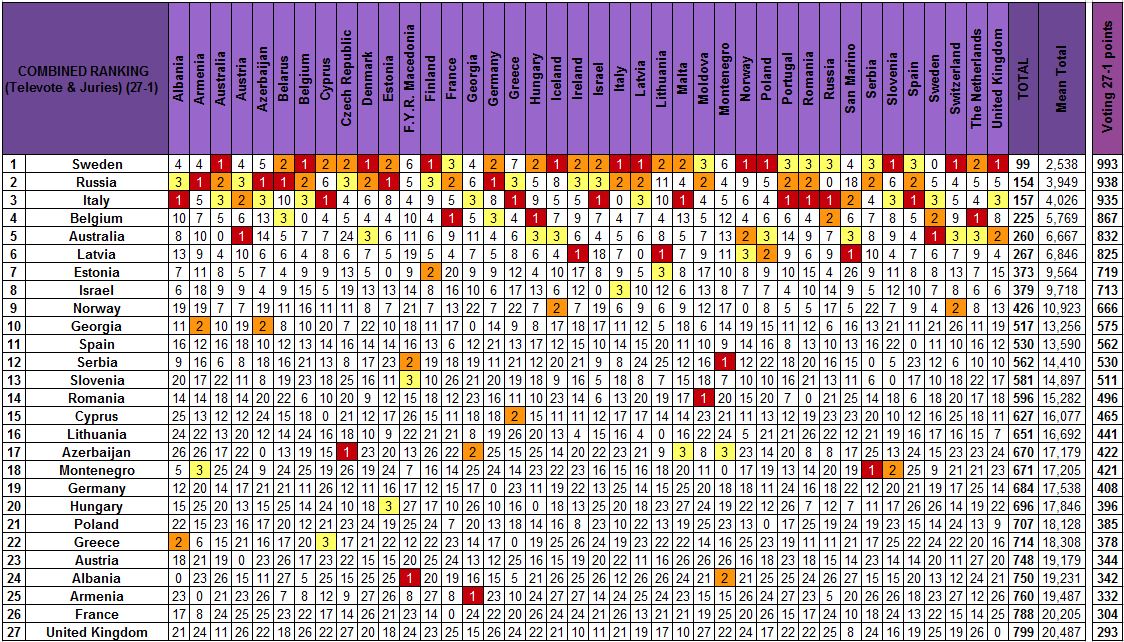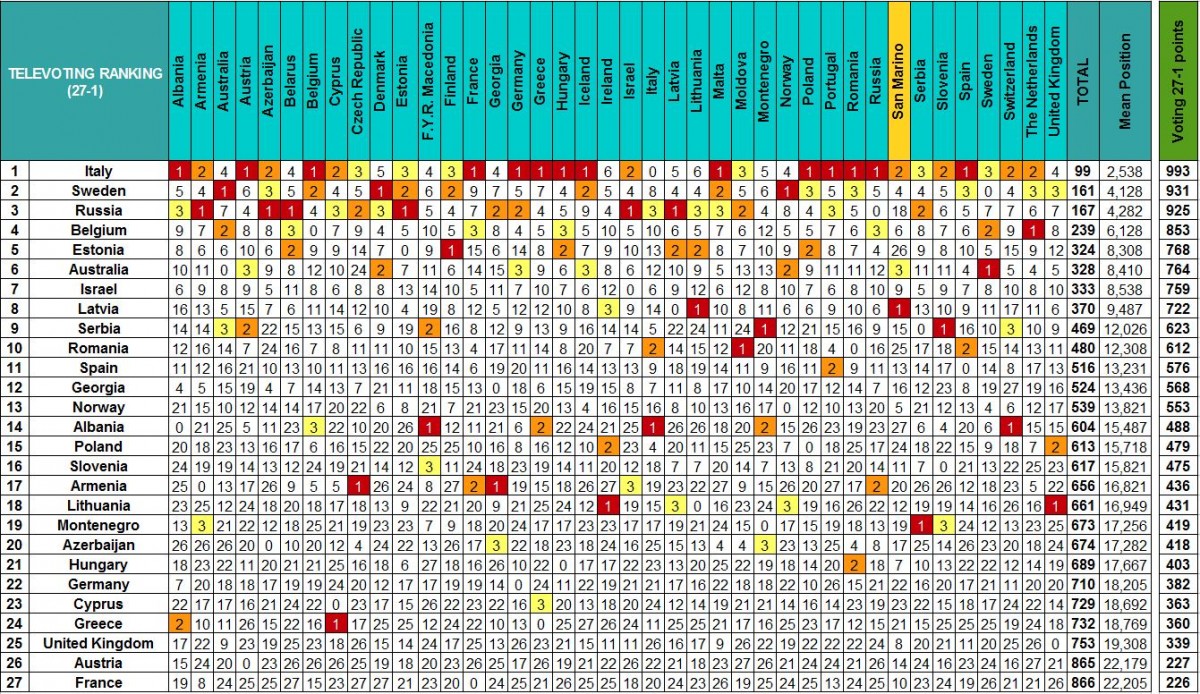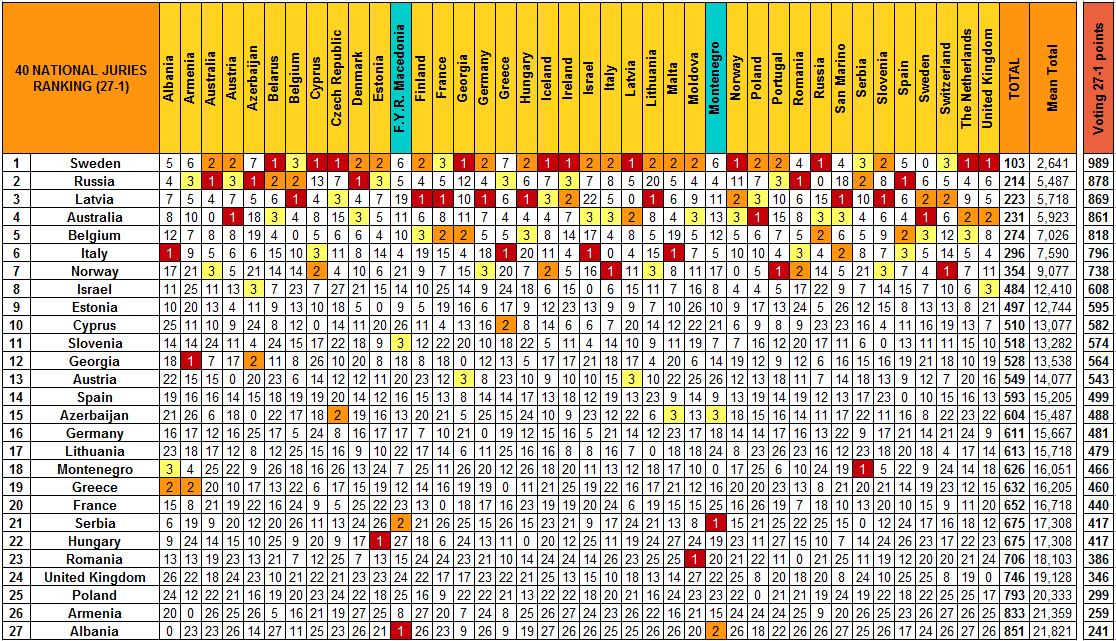This article compares the official Eurovision 2015 results with those from the juries and the televoting, and shows the surprising differences if they had voted for their TOP 27 instead of the usual TOP 10.
Since the introduction in 2009 of the 50% jury /50% televoting system, this is the first time that the winner of the Eurovision Song Contest has not won the televoting. Indeed, Sweden won the contest thanks to the 200 national juries left in Europe (and Australia), who ranked Måns Zelmerlöw in the top of the 27 finalists, followed by Italy, who they ranked just 6th. However Italy won the televoting, followed by Russia and Sweden.
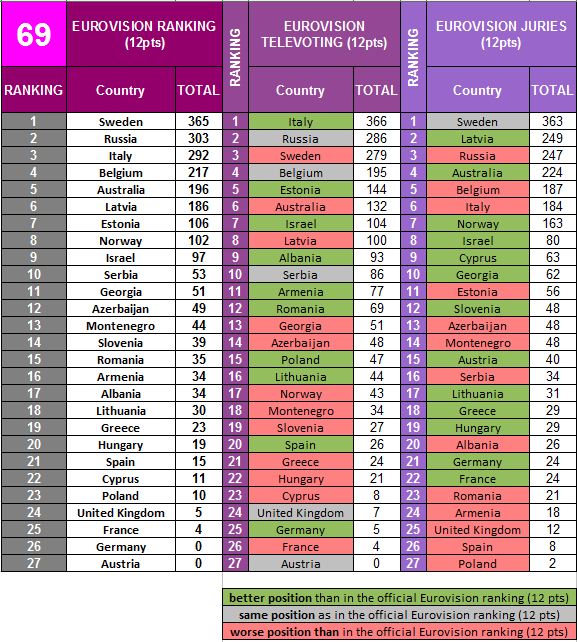
Is it a fair result? According to the standards of the competition Sweden won Eurovision, there is no doubt. By cons, if we disregard the standards: is it really fair that 200 people had as much weight as the thousands of people who voted by telephone for Italy? Wouldn’t it have been better a larger panel (10 or 15 people per country), less difficult to “bribe”? And taking into account the number of the people actually calling, wouldn’t it be fairer to give a greater weight to the televoting, 60%, 70% or even 75% ?
At the beginning I was for the introduction of the juries to reduce the impact of the “geopolitical” and “neighborhood” votes. Thanks to the juries we have seen in 2015 for example that for once Cyprus has not given its “12 points” to Greece, despite winning the televoting, and that’s something. Similarly France, Spain and Portugal have not given their foreseeable televoting “10 points” to Armenia, Romania and Spain respectively thanks to (or because of) the juries.
But there are some other countries where the juries have changed nothing: for example Romania kept its usual “12 points” from the televoting because the Moldovan juries gave them “12 points” as well. And worse, some juries helped their neighbours by giving them more points than the ones received in the televoting : Georgia, for example, after being 5th in the Armenian televoting and 4th in Azerbaijani one, received 10 points from these neighboring countries, thanks to some friendly juries. And the Greek juries helped Cyprus to get 10 points, after being “just” 3rd in the Greek televoting : therefore, some juries have increased the “neighborhood” voting … but the juries weren’t they there to do precisely the opposite thing???
Regarding countries who benefit from the professional juries, let’s talk about France : since the current system was instaured, 2009, only Jessy Matador lost some standing positions (four) due to the juries. The other 6 singers managed to improve their televoting results, specially Patricia Kaas who, after being just 17th for the european televoters, reached a respectful 8th place in the constest, thanks to her 4th place with the juries.
In the opposite side, we have my country, Spain : it never had many geopolitical friends (Portugal, Switzerland and Andorra… which doesn’t take part in the contest anymore…), so we could expect their results to be improved by the juries, as for France. However, most of the Spaniards have done worse with the juries, and only Ruth Lorenzo and specially Pastora Soler have improved their rankings thanks to them. The other 5 entries have been placed in the bottom 5 by the juries, including 3 last places and a penultimate one. OK, I agree that Raquel from ESDM had not a good performance, but were Soraya and Lucía Pérez the worst ones? and did Edurne deserve to be 26th?
And then we can also talk about some juries with suspicious behaviour : the 5 Armenian juries placed their “enemy” Azerbaijan last, and so did the 5 Azerbaijani juries : they all thought that Armenia deserved the last place. But not only that : the 5 Azerbaijani juries gave nearly the same ranking to the songs (no more than 5 or 6 points gap for the same song). And Armenian juries had a too similar taste as well, but the gap was bigger for some songs, so maybe they all actually liked the songs from Greece, Montenegro, Russia and Georgia. Anyway, the EBU didn’t disqualify them, and did however disqualify Montenegro and FYR Macedonian juries… so we wonder how suspicious they were their rankings…
In the end, each year after the contest there are some unhappy people saying : “it’s all about politics”, “Scandinavian (or Eastearn) mafia voting for themselves’ or “nobody likes us (France)”.
Anyway, this year we’ve seen some statistical new facts :
- The first “nil points” since the introduction of the semi-finals, which represent the worst ever ranking for Germany in the contest, and the first “nil points” for a host country (Austria).
- The TOP 3 (Sweden 365 points, Russia 303 points, Italy 292 points) got one of the best scores in history (only Norway 2009 with 387 points and Sweden 2012 with 372 points did better). Besides, it is the first time that a runner-up country (Russia) managed to get more than 300 points.
- Ironic, in the biggest final ever (27 songs), instead of seeing the points scattered, the TOP 5 (Sweden-Russia-Italy-Belgium-Australia) got 60% of the points. And the TOP 9 got 80% of them… That is, the remaining 20% of the points were shared by 18 countries. So the ranking from 10th position downwards is really close, and not very meaningful…
- The country in the 10th position (Serbia) got only 53 points (with more than the half, 28 points, coming from former-yugoslavian countries), just 3 points above the Spanish entry in 2011, who was only 23rd from 25, with 50 points.
- France got its 4th consecutive bottom 5, with 4 points… thanks to Armenia and to the 5 juries from San Marino (with only 2 of them placing Lisa Angell in their TOP 10, by the way!).
After these facts, and specially because of the “nil points” that Ann Sophie got for Germany, the German newspaper “Bild” published an interesting article wondering whether her ranking was fair. They highlighted that the current system gives points only to the TOP 10 songs, and that if any song were 11th for all the juries, it would finish last of the contest with “nil points”, as their national Ann Sophie. So, in order to repair this mistake, they were proposing to apply in the constest the same method used by all the national juries since 2013 : to rank all the songs from the 1st to the last one, instead of voting only for the TOP 10.
This article was showing the ranking of the constest if this system had been used. First of all, it proved that the contest TOP 7 would have been the same, because these countries were already in most of the TOP 10 of the national juries. However it showed some differences, for example that Germany would have been 19th (so something better that their historical “nil points”). But for me the biggest surprise was to discover that my country, Spain, would have reached a respectful 11th place instead of the 21st place that Edurne got in Vienna. And this fact was proving what “Bild” was predicting : a country who was close but below the TOP 10 (11th in this case), might finish last (21st place with 15 points… it is one of Spain’s worst results ever!!!).
As this article was showing the ranking but not the complete scoreboard, I’ve tried to compute it myself. And now I can confirm that what “Bild” was saying was true : “Amanecer” would have been 11th if all the votes had been taken into account instead of only the TOP 10… You can find the complete scoreboard at the end of this article, but here you have first a recap of it, showing :
- In the left side, the official “EUROVISION RANKING (12pts)”.
- Right after, the “COMBINED RANKING” computed by adding the 1-27 rankings (50% juries, 50% televoting) of the 40 voting countries. Note : each of these national rankings was used by the EBU to get the official TOP 10 of the 40 countries.
- Right after, the “TELEVOTING RANKING (27-1)” computed by adding the 1-27 rankings (100% televoting) of the 40 voting countries. Note : as San Marino could not use the televoting, I have used their expert juries’ 1-27 ranking instead.
- In the right side, the “40 NATIONAL JURIES RANKING”, computed by adding the 1-27 rankings (100% expert juries) of the 40 national juries. Note : as Montenegro and FYR Macedonian juries were disqualified by the EBU, I have used their televotings’ 1-27 ranking instead.
For the 3 rankings, I have also added column “Voting 27-1pts”, showing the points that each country would have scored if the fisrt one had received 27 points, the 2nd one 26 points, and so on. And in order to better see the gap between the rankings, I have used a green background for those countries who would have scored better with that method, a red background for those who would have scored worse, and a gray one for those who would remain in the same position :
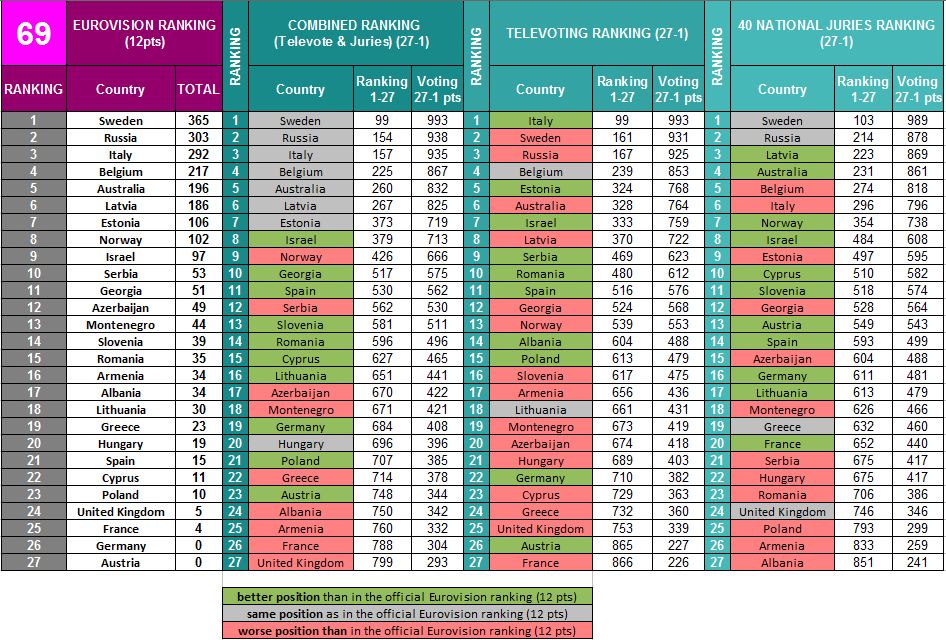
As this is a French website, let’s discuss about France first : would France have scored better with this new system? In fact no… the COMBINED RANKING shows that France would pass from the 25th of the official result to the 26th, so it would get the same ranking as the Twin Twin last year… In fact, even if for the expert juries France would have deserved the 20th place, for the european televoters Lisa Angell should have been 27th and last (but with 226 points, no “nil points” at least!!).
But talking about the other countries, let’s see the biggest gaps obtained with this new system :
- The biggest gap would be the Spanish ranking : Spain would gain 10 places, from 21 to 11, as with this system she would have been the 11th in the televoting and the 14th for the expert juries. Ironic, Edurne’s ranking would have been considered a very good one (equivalent to the TOP 10 from Pastora Soler and Ruth Lorenzo) and however Edurne came from Vienna with one of Spain’s worst results… what a pitty for her!
- Germany would gain 7 places, from 26 to 19, thanks to her 22nd place in televoting and her 16th place in the expert juries’ ranking. So, no “nil points” for Ann Sophie indeed!
- Cyprus would gain 7 places as well, from 22 to 15, because even if he was only 23th with televoters, he got the 10th place from the juries.
- Armenia would lose 9 places, from 16 to 25, mostly because of the expert juries, who thought that Armenia deserved just the 26th place.
- Albania would lose 7 places, from 17 to 24, due to her last place with the expert juries.
Some other gaps, less remarkable this time : the 4 places that Austria would have gained (so no “nil points” for them either), and the 5 places that Azerbaijan and Montenegro would have lost.
Besides, if this method had been applied in 2015, the gap in the points of the TOP countries would have been smaller, and the suspense would have been bigger. In fact, the gap between the winner Sweden and the runner-up Russia would have passed from 62 points to 55 points. But taking into account that with the official voting we would need at least five “12 points” and 2 extra points to reach the 62 points gap, that means that the winner would be known (the latest) when 6 juries were remaining to vote. However, with the new system, the winner would have been known only 3 juries before the end (only two “27 points”, and some extra minor points are needed to reach a 55 points gap).
But, taking into account that the constest TOP 7 would remain the same with this new method, should the EBU actually propose this new voting method for 2016? Because in the end the most important thing is the winner song, and this new method wouldn’t have change it. And besides, would the europeans accept not to hear the famous “12 points” (used since 1975)?
If we take a look at Europe’s most succesful national final, the Swedish Melodifestivalen, we see that their televoting results are not announced by giving “12 points”, but by distributing the points proportionnally to the calls received by each song. And this way permits to keep a big suspense, as no one knows how many points a song can get… Therefore, the “12 points” method is not the only one permitting to keep a good “eurothiller”.
Following this idea, we could for example stop giving a fix number of points to the winner (27 points to first one, 26 to the 2nd, etc.), and increase the suspense by giving instead the addition of both televoting and juries voting points of each country (27+27). For example :
- The televoting winner in France (Italy) would receive their maximum 27 points, plus the number of points corresponding to their 15th place with French juries : 13 points. That is, Italy would receive 27+13=40 points from France.
- Belgium, 2nd for French expert juries (26 points), and 3rd for French televoters (25 points), would get 51 points from France.
- Sweden, 9th for French televoters (19 points), and 3rd for French expert juries (25 points), would get 44 points from France. And so on.
Note : I must admit that this last method would nearly give the same ranking as if only giving 27 points to the winner, 26 poins to the 2nd, etc. So, is it worth to complicate the voting even more?
In any case, as nowadays the spokespersons announce only their country’s TOP3, and the rest of the TOP10 is displayed directly on screen, the EBU could do a similar thing to announce the TOP27. But, to sustain the suspense, it could keep on showing on screen the countries ranked between positions 10 and 4, then announce their TOP 3, and then display their bottom 17 on the scoreboard directly : it would take exactly the same time as nowadays, with the incentif of not knowing until the end whether a country has finished in the top or in the bottom of each jury.
So, what an amount of ideas for the EBU! Here you have a summary :
- increase the number of expert juries by country
- increase the weight of televoting compared to expert juries
- vote for all the songs (TOP 27), instead of only the TOP 10
- stop giving a fixed number of points to the voted countries (12, 10, 8, … 1 points, ), and give instead the real sum of points got from televoting and jury (27…1 + 27….1).
Considering this year’s injustices towards Spain, Germany and Austria, I would love the EBU to test it, starting in the next Junior Eurovision Song Contest in Bulgaria. It would have the advantage of not needing to give the initial “12 points” to the children at the beginning of the competition since all the songs would receive at least 1 point from each jury. And we could verify whether all these changes were really worthy, before introducing them in the (Senior) Eurovision Song Contest.
Well, and before ending this long article, for those who like Eurovision scoreboards, I invite you to discover the ones corresponding to the three 27-1 rankings. Surprised?
 eurovision69 – eurovision song contest 2017
eurovision69 – eurovision song contest 2017 


